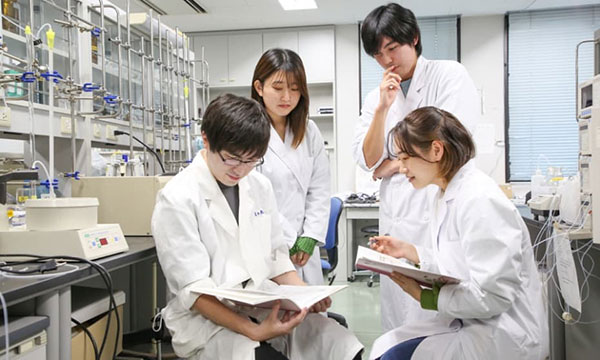Faculty of EngineeringDepartment of Applied Chemistry and Bioscience
Applications are also open to international students.
Chemistry, biotechnology, and biology have contributed to improving our lives and understanding various issues. In the Department of Applied Chemistry and Bioscience at KAIT, faculty members with cutting-edge knowledge conduct advanced studies in these fields. Our research aims to develop innovative products, services, and new findings that contribute to humanity. Confident in our curriculum, we provide students with a quality education that equips them to become skillful and knowledgeable researchers and/or engineers who make significant contributions to society.

Education
Applied Chemistry Course
Applied chemistry is an important research field that explores renewable energy and
the development of novel materials, medicines, and daily necessities that support our lives.
In addition, applied chemistry helps solve global environmental problems. We focus on
developing researchers and engineers with solid basic skills who contribute to science and
industries.
In this course, students can conduct research and chemical experiments from freshman year. The students in this course have plenty of chances to apply the knowledge learned
in lectures to cultivate practical skills. Presentation classes and problem-solving classes will
help to improve skills that are useful for research in senior year and after graduation.
Applied Bioscience Course
Applied Bioscience studies biochemical reactions in various organisms and applies the
mechanisms for developing unique products and services related to health care,
pharmaceuticals, cosmetics, energy, food, and chemicals using biotechnology.
In this course, students learn basic to advanced biotechnology skills and knowledge
through fulfilling lectures and experiments. In addition, each student in this course has the
opportunity to plan, conduct, and present research they have designed. Through these
lectures and experiments, students acquire skills and knowledge useful for
researchers and engineers in the biotechnology field.
Life Science Course
The Life Science course offers numerous opportunities to learn from nature, through observation ranging from the micro to macro scale. It focuses on the practical application of knowledge, studying life mechanisms such as neurobiology, evolutionary biology, and marine ecology. Additionally, students have the opportunity to deeply engage with and practically apply knowledge in biology, chemistry, physics, and information technology. This holistic approach helps to improve their logical thinking and creative abilities, enabling them to apply their knowledge in solving real-world issues. Consequently, through this comprehensive education, students will develop the skills and knowledge necessary for tackling and solving unpredictable challenges.
For more details, please refer to the Japanese page.
